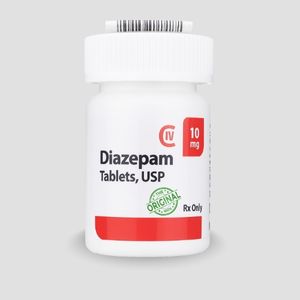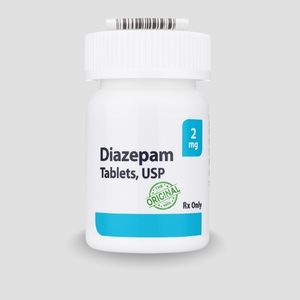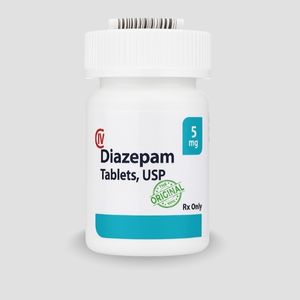Buy Diazepam Online
Showing all 3 results
What is Diazepam?
Diazepam belongs to the benzodiazepine family of drugs that produces a calming effect and helps treat a range of conditions from anxiety to withdrawal symptoms. The medicinal effect of this medicine begins after 15 to 60 minutes of taking it. There are various ways to take this medicine, such as orally, inserted into the rectum, injecting into the muscle/vein, or using it as a nasal spray. “Diazepam is one of the most often prescribed medications in the world”. Diazepam tends to increase gamma-aminobutyric acid (GABA) activity, which is a particular chemical that sends signals throughout your nervous system. Your body may turn into an excited state if you don’t have enough GABA in your body, and this will lead to anxiety, muscle spasms, or seizures. This drug will help collect more GABA in your body, and it will help decrease your stress, muscle spasms, and seizures.
Important Information
Diazepam oral tablets can slow down the activity of your brain and interfere with your thinking, judgment, and motor skills. So, you must not drink alcohol or use any other drugs that can slow down your brain’s activity while taking Diazepam. Would you please resist driving and operating heavy machinery that requires alertness until you know the effect of this drug on you? This medicine is still not under consideration for use by anyone younger than six months. “Do not give Diazepam to a child without a doctor’s advice”.
What to know before taking Diazepam?
You should resist taking Diazepam if you are allergic to it or other similar drugs such as Klonopin, Xanax, and others or if you have any of the following medical conditions:
- Severe liver disease
- A severe breathing problem
- Myasthenia gravis
- Sleep apnea (interruption in breathing during sleep)
- Alcoholism or drug addiction to any drug that is similar to Diazepam.
Consult your medical healthcare provider if you ever had any of the following medical conditions:
- Glaucoma
- Asthma, emphysema, bronchitis
- Kidney or liver disease
- Epilepsy or other seizure disorder or convulsions
- Chronic obstructive pulmonary disease (COPD)
- A drug or alcohol addiction
- Mental illness, depression
- Suicidal thoughts or behavior
During the treatment of seizures, do not initiate or stop taking Diazepam. “Avoid taking it during pregnancy and if you need it, then take your doctor’s advice before doing so”. It may harm the unborn baby, but having an attack during pregnancy is harmful to both the mother and the baby. Tell your doctor if you conceive while taking this medicine. In treating alcohol withdrawal, anxiety, or muscle spasms: your baby could become dependent upon it if you take this drug during pregnancy. It can lead the baby to life-threatening withdrawal symptoms. A drug-dependent baby may need medical treatment for several weeks and cause health loss to the baby.
How to take Diazepam?
- Take Diazepam precisely as per your doctor’s recommendation. Typically the doctor starts your treatment with an effective lower dosage and adjusts it over time to reach the required dosage according to your medical condition. Ultimately they will provide the smallest dosage that will give the desired effect.
- Take Diazepam orally with or without food as per your doctor’s directions. If you are taking the liquid form of this drug, carefully measure the appropriate dose using a dose-measuring device rather than a kitchen spoon.
- The doctor will increase the dosage based on your response to the medicine. The drug processing ability of your body will be slower. Your doctor may start on a lower dosage because too much of the drug in your body can be toxic.
Diazepam side effects
- Common side effects of Diazepam may include fatigue, drowsiness, ataxia, weakness in muscle, tremor, headache, dizziness, nausea, constipation, dry mouth, or excessive saliva.
- A severe allergic reaction to Diazepam is rare. However, take medical help immediately if you notice any severe allergic reaction symptoms, including severe dizziness, hives, trouble breathing, swelling/itching of your lips, throat, face, or tongue.
- Tell your medical healthcare professional immediately if any severe side effects occur, including:
- Trouble walking;
- Trouble sleeping;
- Shaking (tremors);
- Muscle weakness;
- Yellowing of eyes or skin;
- Trouble urinating;
- Infection symptoms such as fever, chills, sore throat that does not go away.
- Mood changes or mental disorders such as agitation, memory issues, confusion, hallucinations, depression, restlessness



